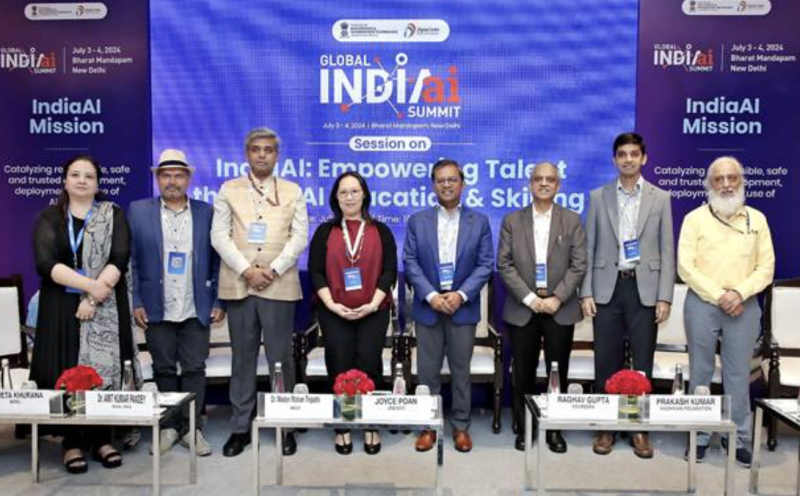The Global INDIAai Summit successfully came to a close today at Bharat Mandapam, New Delhi. Over the last two days, 12 side sessions were organized, which were graced by 2,000 global AI experts, Policy makers, Artificial Intelligence (AI) practitioners, Industry/Startups, and Academia. Over 10,000 AI enthusiasts joined the session virtually. Some additional sessions were held in closed door meetings having delegates and experts of Global Partnership on Artificial Intelligence (GPAI). The side sessions were held in public and live streamed for wider participation.
The key highlights and outcomes of the summit are as follows:
- The summit’s registration got oversubscribed. 2,000 AI experts and practitioners attended the sessions physically and the virtual participation crossed 10,000.
- Each session saw in-depth and insightful discussion on several aspects, that included key challenges in implementation, the available western model, India’s unique need in shaping its AI discourse for meeting its domestic demand and for attaining the global AI leadership.
- India set the global discourse by emphasizing the intent of the Government to democratize AI and make it accessible to all.
- Sessions on the key pillars of INDIAai Mission demonstrated India’s planned action and commitment to build an inclusive and robust AI ecosystem in the country and lead the global AI innovation.
- The Global South countries acknowledged and appreciated the role of India to give voice to them at the global AI forum and bridge the gap with Global North.
- The convening of Collaborative AI on Global Partnership (CAIGP) brought together GPAI members, AI experts and industry representatives to identify mechanisms to overcome the global AI divide.
- The OECD - OCDE and GPAI announced a new integrated partnership on AI at New Delhi.
- The GPAI members came to a consensus about the future vision of Global Partnership on Artificial Intelligence. Some of the key points included in the future vision are as follows:
- Recognise the transformative potential of AI in shaping the future of our societies and economies
- Acknowledge the emerging risks and challenges posed by AI systems
- Share a commitment to fostering trustworthy and human-centric AI
- Reaffirm the collective commitment to the OECD Recommendation on AI and the UNESCO Recommendation on the Ethics of AI
- Recall that the GPAI has been a unique initiative for global multi stakeholder cooperation on AI
- Recognise the New Delhi 2023 GPAI Ministerial Declaration, where GPAI’s unique and independent identity is emphasized as a nodal initiative that plays a key role in global cooperation on AI innovation and governance.
- Overall, the summit led to in-depth deliberations and resulted in deep insights on several implementation aspects of INDIAai Mission, that inter-alia include (a) Multi-LLM models to meet the diverse need of India, (b) Platformization and standardization of AI ready data (c) Partner ecosystem and multi-stakeholder approach to implement INDIAai Mission from technology, policy, framework, research, industrial, startup, ethical, youth, business, and academic perspectives, and (d) weaving together the strength of India viz. its skilled & talent ecosystem, demand ecosystem, researcher, startup and industrial ecosystems.
The brief of side sessions held today, i.e. the second day of the summit, is as follows:
Side Session 6: IndiaAI: Empowering Talent through AI Education & Skilling
The session began with a keynote by Prof. T G Sitharam, Chairman, AICTE. The session included distinguished panelists, namely Ms. Shweta Khurana, Sr. Director, Intel (Moderator), Mr. Amit Singhee, CTO, IBM, Ms. Joyce Poan, Chief of Education, UNESCO, Mr. Raghav Gupta, Managing Director, India & Asia-Pacific, Coursera, Mr. Prakash Kumar, CEO, Wadhwani Government Digital Transformation, and Mr. Anil Sahasrabudhe, Chairman, NETF.
The discussion covered India’s unique needs and collaboration among industry, public sector and society to build an AI-ready generation in India, emphasizing human intelligence to thrive in an AI-driven world. The need for mutual recognition of certifications was also discussed to ensure the effectiveness of training and skill development initiatives across different regions and countries. The importance of curated and age-appropriate AI learning environments was also covered.


.jpg)